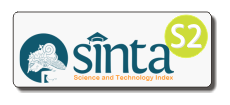PENYUSUNAN DAN IDENTIFIKASI PROPERTI PSIKOMETRIS SKALA STRATEGI KOPING AKADEMIK PADA MAHASISWA
Abstract
Pengukuran mengenai strategi koping (coping strategy) penting dilakukan guna memberikan informasi kecenderungan strategi koping yang diterapkan mahasiswa serta memberikan intervensi sesuai kebutuhan berdasarkan informasi yang didapat. Penelitian ini bertujuan untuk menyusun skala strategi koping akademik berdasarkan tiga aspek menurut Sullivan (2010) yaitu Approach, Avoidance, dan Social Support, serta menyajikan informasi properti psikometris yang ada. Analisis properti psikometri dalam penelitian ini meliputi reliabilitas dengan menggunakan pendekatan konsistensi internal Alfa Cronbach, validitas konstruk dengan analisis faktor konfirmatori, dan validitas kriteria. Hasilnya, skala strategi koping akademik memiliki koefisien reliabilitas Alpha sebesar 0,808 untuk dimensi Approach; 0,818 untuk dimensi Avoidance dan 0,868 untuk dimensi Social Support. Dari hasil analisis faktor konfirmatori dengan SEM, model yang diajukan yang terdiri dari tiga faktor dan model yang diajukan tersebut memenuhi kriteria fit (GFI = 0,920, CFI = 0,923, RMSEA = 0,076). Uji validitas kriteria juga dilakukan, hasilnya strategi koping Approach dan Avoidance berkorelasi signifikan dengan variabel depresi, kecemasan, dan stres. Secara umum, skala ini memiliki properti psikometris yang memuaskan, pengembangan skala ini di masa depan terkait isu metodologis dibahas dalam tulisan ini.
Keywords
Full Text:
PDFReferences
Aiken, L. R. (1985). Three Coefficients for Analyzing the Reliability and Validity of Ratings. Educational and Psychological Measurement, 45(1), 131-142.
Aliyah, I. (2014). Pengaruh kesesakan dan tipe kepribadian terhadap coping pada penumpang Kereta Api Rangkas-Jakarta. Tazkiya Journal of Psychology.19(1),21-32
Azwar, S. (2012). Penyusunan Skala Psikologi. Yogyakarta: Pustaka Pelajar
Bandalos, D. L. (2002). The effects of item parceling on goodness-of-fit and parameter estimate bias in structural equation modeling. Structural Equation Modeling, 9(1), 78-102.
Carver, C. S., Scheier, M. F., & Weintraub, J. K. (1989). Assessing coping strategies: a theoretically based Approach. Journal of Personality and Social Psychology, 56(2), 267.
Endler, N. S., & Parker, J. D. A. (1994). Assessment of multidimensional coping: Task, emotion, and Avoidance strategies. Psychological Assessment, 6(1), 50-60.
Gilmore, A. D., Osho, G. S., & Heads, A. B. (2013). Stres, Anxiety, Depression And Psychological Responses Among African Americans: Empirical Investigation And Coping Strategies. American Journal of Health Sciences (AJHS), 4(3), 121-130.
Hooper, D., Coughlan, J., & Mullen, M. (2008). Structural equation modelling: Guidelines for determining model fit. Articles, 2.
Hu, L., & Bentler, P. M. (1999). Cutoff criteria for fit indexes in covariance structure analysis: Conventional criteria versus new alternatives. Structural Equation Modeling: A Multidisciplinary Journal, 6(1), 1-55.
Kirikkanat, B., & Kali Soyer, M. (2016). Adaptation of The Academic Coping Strategies Scale in Turkey: A Study With Undergraduates. International Journal of Teaching and Education, IV(1), 26-44.
Kuncharin, L., & Mohamad, A. R. B. (2014). Coping Strategies on Academic Performance among Undergraduate Students in Thailand. The Standard International Journal Transactions on Industrial, Financial & Business Management, 2(3), 58-61.
Lazarus, R. & Folkman, S. (1984). Stres, Appraisal and Coping. New York: Springer.
Lazarus, R. S. (1993). Coping theory and research: past, present, and future. Psychosomatic Medicine, 55(3), 234-247.
Lovibond, S. H., & Lovibond, P. F. (1995). Manual for the Depression Anxiety Stres Scales (DASS). New South Wales: Psychology Foundation Monograph
Moos, R. . (1984). Context and coping: Toward a unifying conceptual framework. American Journal of Commukirnity Psychology, 12(1), 5-25.
Ningrum, D.W. (2011). Hubungan antara optimisme dan coping stres pada mahasiswa UEU yang sedang menyusun skripsi. Jurnal Psikologi, 9(1), 41-47
Oei, T.P.S , Sawang, S., Goh, Y.W & Mukhtar, F. (2013): Using the Depression Anxiety Stres Scale 21 (DASS-21) across cultures, International Journal of Psychology, DOI:10.1080/00207594.2012.755535
Pasudewi, C. Y. (2012). Resiliensi pada remaja binaan bapas ditinjau dari coping stres. Journal of Social and Industrial Psychology, 1(2).14-21
Schumacker, R. E., & Lomax, R. G. (2010). A beginner's guide to structural equation modeling (3rd ed). New York: Routledge.
Skinner, E. A., Edge, K., Altman, J., & Sherwood, H. (2003). Searching for the structure of coping: A review and critique of category systems for classifying ways of coping. Psychological Bulletin, 129(2), 216-269.
Stevens, J.P. (1992). Applied multivariate statistics for the social sciences (2nd edition). Hillsdale, NJ:Erlbaum.
Struthers, C. W., Perry, R. P., & Menec, V. H. (2000). An examination of the relationship among academic stres, coping, motivation, and performance in college. Research in Higher Education, 41(5), 581-592.
Suldo, S. M., Dedrick, R. F., Shaunessy-Dedrick, E., Fefer, S. A., & Ferron, J. (2014). Development and Initial Validation of the Coping With Academic Demands Scale How Students in Accelerated High School Curricula Cope With School-Related Stresors. Journal of Psychoeducational Assessment. 33(4), 357-374
Sullivan, J. R. (2010). Preliminary Psychometric Data for the Academic Coping Strategies Scale. Assessment for Effective Intervention, 35(2), 114-127.
Thien, L. M., & Razak, N. A. (2013). Academic Coping, Friendship Quality, and Student Engagement Associated with Student Quality of School Life: A Partial Least Square Analysis. Social Indicators Research, 112(3), 679-708.
DOI: http://dx.doi.org/10.26555/humanitas.v14i2.6841
Refbacks
- There are currently no refbacks.
HUMANITAS: Indonesian Psychological Journal
ISSN 1693-7236 (print), 2598-6368 (online)
Email : humanitas@psy.uad.ac.id

This work is licensed under a Creative Commons Attribution-ShareAlike 4.0 International License.












